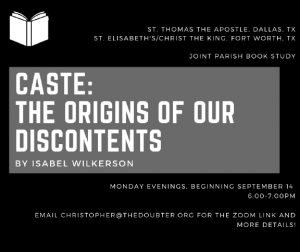Will you strive for justice and peace among all people, and respect the dignity of every human being?
I will, with God’s help!
My Dear Doubters of Great Faith,
 It was over ten years ago that I began my official journey toward ordination in the Episcopal Church, and one of my first assignments was the penning of a “spiritual autobiography.” I crafted my work around the touchstone of our particular Episcopal tradition, the Baptismal Covenant, specifically the questions that get asked of or on behalf of candidates. These questions really are foundational to our Christian identity, because they reflect the ways Jesus lived out his human, and yet divine existence, thereby modeling goals for our own behavior. As such, they are (or should be) the lenses through which we view all of life.
It was over ten years ago that I began my official journey toward ordination in the Episcopal Church, and one of my first assignments was the penning of a “spiritual autobiography.” I crafted my work around the touchstone of our particular Episcopal tradition, the Baptismal Covenant, specifically the questions that get asked of or on behalf of candidates. These questions really are foundational to our Christian identity, because they reflect the ways Jesus lived out his human, and yet divine existence, thereby modeling goals for our own behavior. As such, they are (or should be) the lenses through which we view all of life.
But this question of justice, and peace, and dignity, particularly when coupled with the seeking and serving of Christ in all persons, loving neighbor as self, is a particular guide for me, I think, because of my own location on the margins of life as an outsider, the queer kid. There is something about having lived in marginality that makes the sounding cry of justice and peace and dignity for all of God’s creation ring sweet and even more necessary. The way into that work, I believe, is through empathy, touching our own places of marginality so that we can see, feel, and hopefully respond to that place in others.
Jesus most certainly could have shrouded his own marginality, the origins of his questionable birth, in the garments of patriarchal Judaism; however, he chose not to. Instead, he “came out of the closet,” so to speak, and proceeded confidently to the margins, participating in table fellowship with all sorts and conditions of folk, illustrating and demonstrating a new paradigm that up-ended all previous experience and expectation. By doing so, he beckons each of us out of our own closets of marginalization, whatever they may be, to stand confidently with him as co-conspirators in the on-going creation of God’s new world order.
Touching these points of marginalization in our own lives can be difficult, challenging, and yet life-giving, growth-providing work, because it allows us to identify with the pain and struggle of those who walk paths seemingly so different from our own.
Beginning this Monday, September 14, at 6 pm, we’re going to begin together a journey of discovery, of developing a common language to frame some of the Jesus-work we will do in the striving for justice, and peace, and dignity for each and every person, indeed for all human beings. I hope you have purchased and begun to read Isabel Wilkerson’s “Caste: The Origins of Our Discontents,” because these literally are OUR discontents. These are our ills. They are not someone else’s issues or problems.
I can understand the hesitation, the desire to look away. I am sure there were a few who wanted to look away from lynching trees, the kind that held but could not contain Jesus, and the many others. Because in looking, we have to view our own marginalization, our own humanity. And once we have seen, we have no choice but to act, for we can never, ever be the same.
Surely this must be the reason that God’s infinite mercy and grace flow through our given response, “I will, with God’s help!”
For how else could we possibly do this, with anything less than God’s help?
See you in Zoom class Monday night!
Yours faithfully,
Fr. Christopher+

